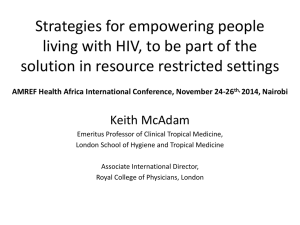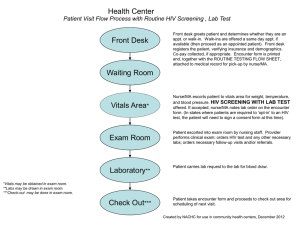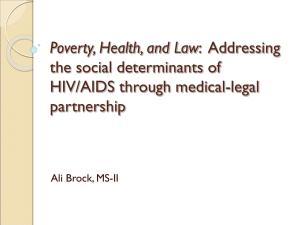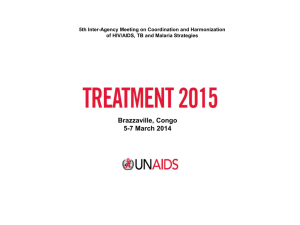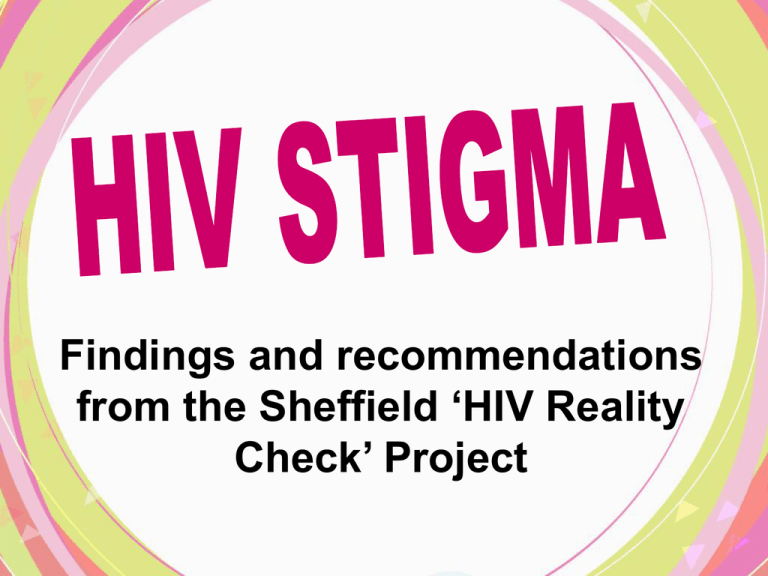
Findings and recommendations
from the Sheffield ‘HIV Reality
Check’ Project
Background on the HIV Reality Check
project
•
Research indicates that most people living with (and/or affected by) HIV have
experienced the effects of stigma. The myths and stereotypes that exist about
HIV have fuelled anxiety, fear and prejudice towards people living with HIV,
which subsequently affects their health and well-being.
•
Stigma leads people living with HIV to experience anxieties about disclosing
their HIV status, resulting in isolation, loneliness and potential mental health
issues. Many people living with HIV have experienced rejection and even abuse
as a result of disclosing their HIV status to partners, friends and family
members. Some have also experienced the trauma of the criminal justice
system due to the increasing criminalisation of people living with HIV for
‘reckless transmission’ of the virus. This has led many to live in fear and
isolation, too frightened to talk about their condition.
•
This also prevents people from seeking professional help such as counselling,
as well as accessing appropriate medical treatment and care, thus affecting their
physical as well as mental health and well-being.
Background on the HIV Reality Check
project
•
Literature Review
•
Consultation with Sheffield service providers
•
Consultation with Sheffield service users
•
Design and deliver of ‘HIV Reality Check’ awareness raising
campaign
•
Training programme for Sheffield based service providers
•
Skills building training course for people living with HIV
•
Production of a training resource pack
Local Perspective – Experiences of people
living with HIV in Sheffield
“I was made homeless when my landlord searched the property and found
medication – the police who turned up treated me as the perpetrator.”
Consultation Participant
“I was married, I’m HIV+ and he was negative – and he left me. How can I
start a new relationship? I’ve been on my own for 9 years and I feel I don’t
have a choice in the matter – how would he react? – I want to live a normal
life but I can’t”
Consultation Participant
“It is so difficult to enter a unit offering support for positive people from the
Receptionist to the Health Care Professionals, there is still that feeling of
trepidation and anxiety that they might react in a bad way, or treat us
differently than other patients. Or even just ask inappropriate questions in
inappropriate situations, such as busy Reception areas. If people do not
attend clinics or appointments then their future health care needs will be
greater.”
Consultation Participant
Local Perspective – Accounts from
Sheffield service providers
“One client had recently been referred from her GP for minor surgery to
remove a skin tag on her neck. When she presented for surgery the Doctor
refused to perform the surgery on the basis that she was HIV+. No
consideration was given to the woman’s confidentiality – anyone could have
overheard or seen her from the waiting area and she left in tears.”
“Health care providers are major contributors to HIV stigma – two years ago
a patient was on a high dependency ward – staff would only treat her if they
were wearing protective visors and other extreme hygiene measures (i.e.
double gloves)…When challenged by Social Worker – Hospital stated that
they did not need to justify these actions.”
“We have to be careful with some visitors that they don’t see each other –
we end up having to guide one person around the building as the other
person leaves – so that they can’t identify each other.”
Conceptual model of HIV related stigma
Cognitive-emotional model
In Small Groups
In small groups discuss the three following questions:
• In what ways have you, or could you address the
stigma and discrimination that impacts on people
living with HIV?
• What have been or what are the challenges and
obstacles?
• What tools or resources have been used or are
needed?
Tips and advice for addressing HIV
related stigma and discrimination
Know The Facts
Having a basic knowledge of HIV can
dispel the myths and misconceptions
about how the virus is transmitted.
Everyone should know that HIV can be a
treatable life-long condition, provided
people are able to access treatment and
support.
There are a range of services for HIV
screening, treatment, care and support in
Sheffield. For more information go to:
www.sexualhealthsheffield.nhs.uk
Don’t Make Assumptions
There is no way of knowing that a person
is HIV positive unless they disclose this
information. Do not make assumptions
about a person’s HIV status or how they
might have contracted the virus based on
their age, ethnicity, sexuality, gender or life
choices
Don’t Make Judgements
Disclosure of HIV status to families,
friends, partners etc can be difficult when a
person feels they may be judged
negatively or ‘blamed’ for their status.
We should not judge a person based on
their HIV status, or compare how they
were infected against how another person
might become infected and offer more or
less sympathy or compassion to one or the
other.
Understand That Disclosure Is
Not Easy
People living with HIV have the same rights as
anyone to a happy, fulfilling life, including pleasurable
and satisfying sex and relationships. However
previous experiences where they have disclosed their
status and have been, or were concerned they would
be rejected by family members, or sexual partners,
may prevent them from disclosing their status.
Rather than assume, or expect a person living with
HIV to have to disclose their status, we should respect
each individual’s right to share this information at a
time when they feel able to and when it feels right for
them. Recent prosecutions for ‘reckless’ transmission
of HIV may also contribute to fears and anxieties
about disclosing HIV status
Challenge Stigma &
Discrimination
•
Wear a red ribbon
•
Challenge discriminatory statements or
behaviours
•
Correct misinformation
•
Understand and respect the anxieties
around disclosure
•
Support and promote World AIDS Day
each year
•
Services can ensure that they are
welcoming and supportive of all people
living with or affected by HIV
Anthony Bains & Matt Harrison
Centre for HIV & Sexual Health
www.sexualhealthsheffield.nhs.uk


